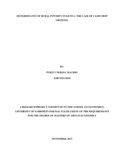Determinants Of Rural Poverty In Kenya: The Case Of Cash Crop Growing
| dc.contributor.author | Machio, Purity N | |
| dc.date.accessioned | 2016-04-28T12:08:53Z | |
| dc.date.available | 2016-04-28T12:08:53Z | |
| dc.date.issued | 2015 | |
| dc.identifier.uri | http://hdl.handle.net/11295/95253 | |
| dc.description.abstract | Poverty in Kenya remains to be an issue of concern despite several measures the government has taken in alleviating it. Rural poverty rates are higher compared to urban poverty levels. Designing appropriate policies requires understanding the determinants of poverty. This paper presents an analysis of factors affecting rural poverty in Kenya with a major focus on cash crop farming with an aim of contributing to efforts towards poverty alleviation. This study uses a logistic model to analyze the determinants of poverty using KIHBS 2005/6 data. The study found that engagement in cash crop farming increases probability of a household being poor. Other factors that significantly affect poverty include: level of household income, level of education of household head, ownership of livestock and the household size. This study recommends that the government should aid the farmers who engage in cash crop farming through the stabilization of fluctuating prices, providing extensive research regarding the types of diseases affecting the crops grown as well as reduced costs of farm inputs and improved accessibility to credit at low interest rates. | en_US |
| dc.language.iso | en | en_US |
| dc.publisher | University of Nairobi | en_US |
| dc.rights | Attribution-NonCommercial-NoDerivs 3.0 United States | * |
| dc.rights.uri | http://creativecommons.org/licenses/by-nc-nd/3.0/us/ | * |
| dc.title | Determinants Of Rural Poverty In Kenya: The Case Of Cash Crop Growing | en_US |
| dc.type | Thesis | en_US |



